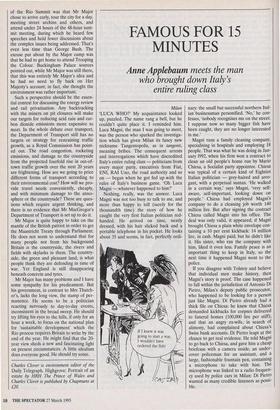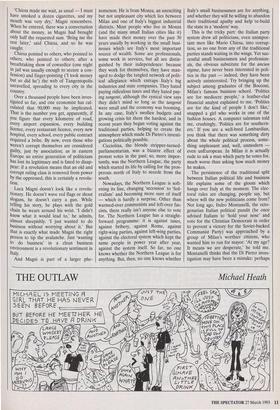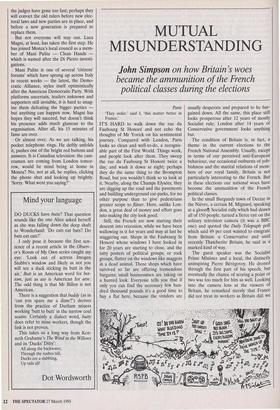FAMOUS FOR 15 MINUTES
Anne Applebaum meets the man
who brought down Italy's entire ruling class
Milan 'LUCA WHO?' My acquaintance looked up, puzzled. The name rang a bell, but he couldn't quite place it. I reminded him. Luca Magni, the man I was going to meet, was the person who sparked the investiga- tion which has given Milan its fancy new nickname Tangentopolis, as in tangenti, meaning bribes. The consequent arrests and interrogations which have discredited Italy's entire ruling class — politicians from every major party, executives from Fiat, EN1, RAI Uno, the road authority and so on — began when he got fed up .with the rules of Italy's business game. 'Oh Luca Magni — whatever happened to him?'
Nothing, really, was the answer. Luca Magni was not too busy to talk to me, and more than happy to tell (surely for the thousandth time) the story of how he caught the very first Italian politician red- handed. He arrived on time, neatly dressed, with his hair slicked back and a portable telephone in his pocket. He looks about 35 and seems, in fact, perfectly ordi- nary: the small but successful northern Ital- ian businessman personified. 'No,' he con- fesses, 'nobody recognises me on the street. I suppose now so many bigger fish have been caught, they are no longer interested in me.'
Magni runs a family cleaning company, specialising in hospitals and employing 18 people. That was what he was doing in Jan- uary 1992, when his firm won a contract to clean an old people's home run by Mario Chiesa, a Socialist party appointee. Chiesa was typical of a certain kind of Eighties Italian politician — grey-haired and arro- gant, with a perpetual suntan. 'He walked in a certain way,' says Magni, 'very self- aware, self-important, looking down on people.' Chiesa had employed Magni's company to do a cleaning job worth 140 million lire. But after signing the contract Chiesa called Magni into his office. The deal was only valid, it appeared, if Magni brought Chiesa a plain white envelope con- taining a 10 per cent kickback: 14 million lire, in cash. Magni paid, but he didn't like it. His sister, who ran the company with him, liked it even less. Family peace is an important thing to keep in Italy, so the next time it happened Magni went to the police.
If you disagree with Tolstoy and believe that individual men make history, then Magni's story is proof. The case happened to fall within the jurisdiction of Antonio DI Pietro, Milan's deputy public prosecutor, who happened to be looking for a person just like Magni. Di Pietro already had a thick file on Chiesa: he knew that Chiesa demanded kickbacks for corpses delivered to funeral homes (100,000 lire per stiff), and that an angry ex-wife, in search of alimony, had complained about Chiesa's Swiss bank accounts. Di Pietro leapt at the chance to get real evidence. He told Magni to go back to Chiesa, and gave him a cheap briefcase with a camera inside, an under- cover policeman for an assistant, and a large, fashionable fountain pen, containing a microphone to take with him. The microphone was linked to a radio frequen- cy used by police cars in Milan: Di Pietro wanted as many credible listeners as possi- ble. `Chiesa made me wait, as usual — I must have smoked a dozen cigarettes, and my mouth was very thy,' Magni remembers. When he entered, there was a conversation about the money, as Magni had brought only half the requested sum. 'Bring me the rest later,' said Chiesa, and so he was caught.
Chiesa pointed to others, who pointed to others, who pointed to others; after a breathtaking show of cowardice (one night in jail was usually enough to secure a con- fession) and finger-pointing CI took money but so did he') the web of Tangentopolis unravelled, spreading to every city in the country.
Over a thousand people have been inves- tigated so far, and one economist has cal- culated that 90,000 may be implicated. That is the number you get, apparently, if you figure that every kilometre of road, every airport expansion, every building licence, every restaurant licence, every new hospital, every school, every public contract required a bribe. By now, even those who weren't corrupt themselves are considered guilty, just by association; as in eastern Europe an entire generation of politicians has lost its legitimacy and is fated to disap- pear: if a revolution means that an old and corrupt ruling class is removed from power by the oppressed, this is certainly a revolu- tion.
Luca Magni doesn't look like a revolu- tionary. He doesn't wave red flags or shout Slogans, he doesn't carry a gun. While telling his story, he plays with the gold Chain he wears around his wrist. 'I didn't know what it would lead to,' he admits, almost sheepishly. 'I just wanted to do business without worrying about it.' But that is exactly what made Magni the right person to tip the avalanche. Just 'wanting to do business' in a clean business environment is a revolutionary sentiment in Italy.
And Magni is part of a larger phe- nomenon. He is from Monza, an unexciting but not unpleasant city which lies between Milan and one of Italy's biggest industrial districts. Most people who live in Monza (and the many small Italian cities like it) have made their money over the past 30 years usually by working in the small busi- nesses which are Italy's most important source of wealth. Some are professionals, some work in services, but all are distin- guished by their independence: because they work for themselves, they have man- aged to dodge the tangled network of polit- ical allegiance which entraps Italy's big industries and state companies. They• hated paying ridiculous taxes and they hated pay- ing tangenti, although the cynical view says they didn't mind so long as the tangenti were small and the economy was booming. In any case, Italy's swollen budgets and growing crisis hit them the hardest, and in recent years they began voting against the traditional parties, helping to create the atmosphere which made Di Pietro's investi- gations politically possible.
Cicciolina, the blonde stripper-turned- parliamentarian, was a bizarre effect of protest votes in the past; so, more impor- tantly, was the Northern League, the party which started its life by calling for the pros- perous -north of Italy to secede from the south.
Nowadays, the Northern League is soft- ening its line, changing 'secession' to 'fed- eralism' and becoming more sure of itself — which is hardly a surprise. Other than warmed-over communists and left-over fas- cists, there really isn't anyone else to vote for. The Northern League has a straight- forward programme: it is against taxes, against bribery, against Rome, against right-wing parties, against left-wing parties, against the electoral system which kept the same people in power year after year, against the system itself. So far, no one knows whether the Northern League is for anything. But, then, no one knows whether Italy's small businessmen are for anything, and whether they will be willing to abandon their traditional apathy and help 're-build the state in a 'modern' way.
This is the tricky part: the Italian party system drew all politicians, even unimpor- tant men like Mario Chiesa, into corrup- tion, so no one from any of the traditional parties stands waiting in the wings. Yet suc- cessful small businessmen and profession- als, the obvious substitute for the ancien regime, have never been interested in poli- tics in the past — indeed, they have been actively uninterested. Try bringing up the subject among graduates of the Bocconi, Milan's famous business school. 'Politics are for mediocre people,' a leather-clad financial analyst explained to me. 'Politics are for the kind of people I don't like,' snapped a girl who works in one of the fashion houses. A computer salesman told me, crushingly, 'Politics are for southern- ers.' If you are a well-bred Lombardian, you think that there was something dirty about the whole political process, some- thing unpleasant and, well, unmodern — even unEuropean. In Milan it is actually rude to ask a man which party he votes for, much worse than asking how much money he makes.
The persistence of the traditional split between Italian political life and business life explains some of the gloom which hangs over Italy at the moment. The elec- toral rules are changing, people say, but where will the new politicians come from? Not long ago, Indro Montanelli, the octo- genarian Italian political pundit (he once advised Italians to 'hold your nose' and vote for the Christian Democrats in order to prevent a victory for the Soviet-backed Communist Party) was approached by a group of Milan's worthier citizens, who wanted him to run for mayor. 'At my age? It means we are desperate,' he told me. Montanelli thinks that the Di Pietro inves- tigation may have been a mistake: perhaps the judges have gone too fast; perhaps they will convict the old rulers before new elec- toral laws and new parties are in place, and before a new generation is prepared to replace them.
But not everyone will stay out. Luca Magni, at least, has taken the first step. He has joined Monza's local council as a mem- ber of Mani Pulite — Clean Hands — which is named after the Di Pietro investi- gations.
Mani Pulite is one of several 'citizens' forums' which have sprung up across Italy in recent weeks — the latest, the Demo- cratic Alliance, styles itself optimistically after the American Democratic Party. With platforms uncertain, leaders unknown and supporters still invisible, it is hard to imag- ine them defeating the bigger parties — but anything can happen now. Magni has hopes they will succeed, but doesn't think his presence adds much glamour to the organisation. After all, his 15 minutes of fame are over.
Or almost over. As we are talking, his pocket telephone rings. He deftly unfolds it, pushes one of the bright red buttons and answers. It is Canadian television: the cam- eramen are coming from London tomor- row, would he mind being at home in Monza? No, not at all, he replies, clicking the phone shut and looking up brightly. 'Sony. What were you saying?'




























































 Previous page
Previous page